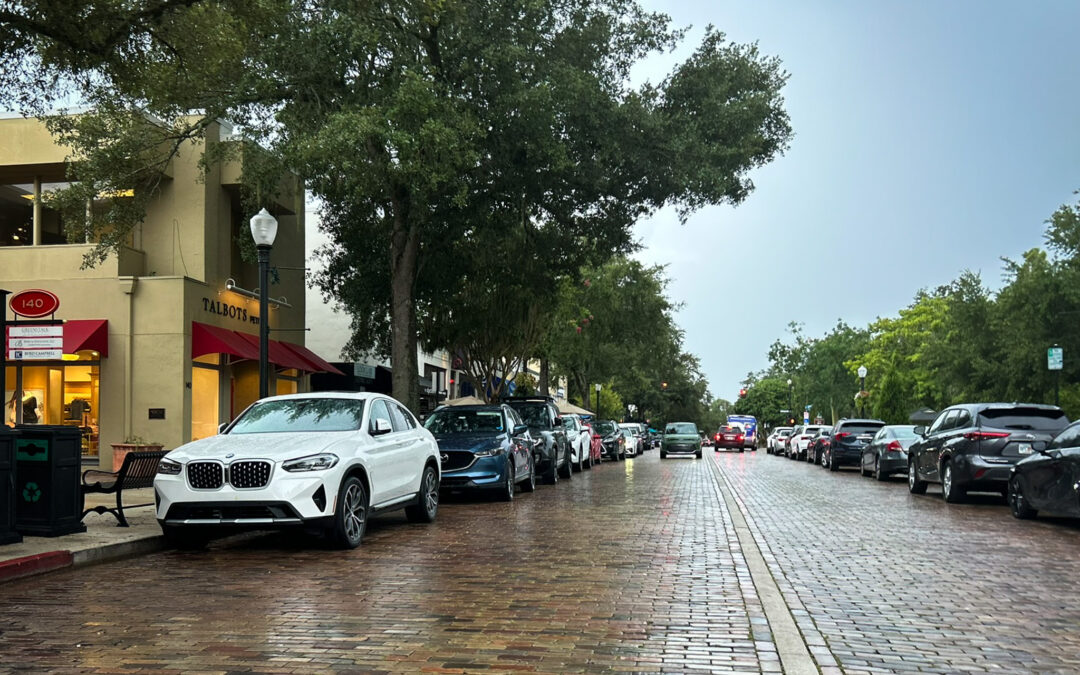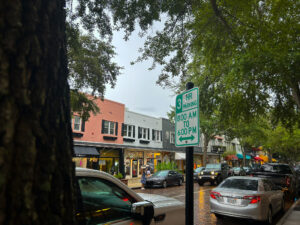Winter Park will likely ditch plans to make Park Avenue a one-way street
Closing two-way traffic would add more parking. But more spots might not be necessary.
Aug. 1, 2024
By Zoey Thomas
Winter Park city staff recommended scratching an idea to turn Park Avenue into a one-way street to increase parking options after a study revealed the area already has a surplus of spaces.
The change would add 41 parking spaces, converting one side of the street from parallel to diagonal spots.
But parking supply along Park Avenue already exceeds demand by 48 spaces on a typical weekday and 37 on a typical Saturday or Sunday, according to a report from engineering firm Kimley-Horn.
The firm charged the city about $35,000 to update its previous study, conducted in 2013, on downtown parking inventory.
“The one million dollar question … is there a parking problem?” said Hongmyung Lim, the Winter Park Public Works & Transportation engineer who presented the study to commissioners at a July workshop. “Generally, our statement would be no, but it really depends on the perspective.”
Parallel parking spots along Park Avenue can be hard to find during peak hours. (Photo: Zoey Thomas)
Finding a spot becomes more problematic during December, Lim said. During that “peak season” in downtown Winter Park, demand outnumbers available spaces by about 135 spots.
But he emphasized there is never a deficit in parking throughout the total downtown area, which stretches west to Denning Drive, south to Fairbanks, east to Interlachen Avenue and north to Webster. Only spots located right along Park Avenue fill up.
“There’s plenty of opportunities to park and walk to your destination in five to ten minutes,” Lim said. “And during the peak season in December, I’m sure when parents bring their kids over, they would like to walk a little bit further than a typical five to ten minutes to show them around.”
The challenge is to help visitors understand their parking options, said Charles Ramdatt, the Public Works & Transportation director, at the workshop.
Randatt is working with the Winter Park Community Redevelopment Agency to create an app that will direct drivers to available spots. He’s already met with Currus AI, a University of Central Florida-based technology program, about the project.
“The additional demand can be covered by overall parking in the general area — we just need to show people where those spaces are,” he said. “The younger generation, especially, is very accustomed to using apps like these.”
Mayor Sheila DeCiccio pointed out the study, which used the same geographic zones as the original 2013 analysis, didn’t account for new demand from the recent $36 million expansion of the Alfond Inn. The expansion, completed in late 2023, included adding new meeting, boardroom and event spaces to the hotel’s New England Avenue space.
“I go to a lot of luncheons there — there’s over 200 people,” she said. “So, I don’t know where they’re going to park all those people.”
The study area also did not include the old Winter Park Library building, where Blue Bamboo Center for the Arts recently signed a lease to open a multicultural live music venue and education hub. Alfond Inn is currently parking cars in the unused library building lot. Once it can no longer do so, valets will have to park elsewhere, the mayor said.
“I think just watching them for two days after they cannot park and stack cars in the old library site is going to tell you a lot where the valet puts all those cars,” DeCiccio said. “I think that is going to cause a huge deficit.”
Alfond Inn spillover parking shouldn’t be problematic as long as valets use garages like the high-vacancy Truist Parking Garage on Comstock Avenue, rather than parking along the street on Lyman Avenue or Comstock Avenue, said City Manager Randy Knight.
Knight also pointed out the city can’t plan its parking around the one month out of the year when spaces become limited.
“The Church doesn’t build parking for Easter Sunday,” he said. “I think that’s what the study’s saying — on a normal day, there’s ample parking.”
After receiving the updated parking report, which found weekend parking demand wasn’t as high as expected, Knight said he no longer recommended going through with a plan he previously supported: closing Park Avenue to two-way traffic.
Although doing so would add 41 parking spots, it would also create a potential safety hazard. The road would only be about 11 to 13 feet wide, which would make it difficult for emergency vehicles to access the area during an accident.
Typically, a one-way street is 16 to 18 feet, and said city engineer Lim.
“After seeing this, and I understand their report, I was much less excited about the one-way option than initially,” Knight said. “It’s not a staff recommendation that we move forward with the one-way …. I think the safety issues outweigh the benefit.”
WinterParkVoice@gmail.com



Parking on Park is a real issue
People now tend to go more to Winter Park Village where it’s easier to park ….
As a business owner on Park Av I can tell you that if you don’t do something attractive for this street it will become a real issue in terms of attendance .
use Mead Gardens for overflow parking and electric shuttles that go back and forth. One big positive would be it’s very shady over there and cars wouldn’t have to sit and bake in the heat.
The “West Meadow” used to be a parking lot. These days it gets beat up 1 day a week by Farmer’s Market and gets trampled further by the occasional charity event and 2 art festivals. Mostly empty. Why not take the part next to post office lot (Carolina Ave.) and expand that for more parking? No asphalt necessary. A few landscape timbers, iron stanchions, some rope, white picket border fence or a low hedge to section it off. Easily another 30-40 spaces for minimal cost.
great idea, Pitt. The City often ignores great ideas – gotta protect the “charm” ya know.
The problem is some people take up more than 1 spot when they parallel park. What about adding markers or stripes on the curbs so people know when they are not parked properly!
I had asked a long time ago about putting markers so that people would know where the space begins and ends, and I was told that that would be unsightly and that they wouldn’t do it. I even asked how about just putting lines vertical to the curb and not just a whole line that’s parallel with the curb and they still said no.
I been in business for 50 years on park Ave there always parking problems for our customers. We need more parking off the avenue for employees for restaurants and retail to park. I see employees coming to work and parking on the avenue.
I think one-way would be more dangerous for two reasons.
First, backing up to exit when visibility may be blocked is hazardous.
Second, and amplifying point one, some drivers would drive faster with a one-way street. Now, drivers both directions know they have to edge their way along while looking out for traffic and exiting parallel parked cars.
Suggest limiting parking time to 2 hours on Park Avenue
I’ve been a resident of Winter Park for 44 years. I love Park Avenue. I worked a half block off Park Avenue for many years. I’ve watched the parking on and around Park Avenue go from okay to miserable. How anyone observes otherwise is baffling to me.
Put the Farmer’s market back in the old train station area! It was much nicer there, with some shade and indoor space. If it’s outgrown that space, use space nearby. Think out of the box. Then use the field where the current Farmer’s Market is for additional parking. But please, don’t cement it over!
So glad the idea of making Park Ave a one way street is not going to happen. Parking can be a problem but if you choose a good time ,you can usually find a place to park.
Employees could park farther away to save spaces for customers. Hospitals, airports and other venues do this regularly. Downtown business owners could solve customer parking if they choose to.
What are the parking garages used for? We do not want Park Ave to be one way. Doing so will add to the traffic nightmare we already have.